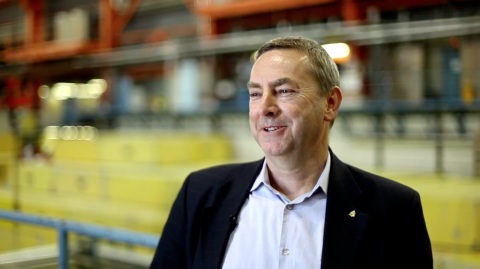
At its recent meeting in Victoria and with unanimous enthusiasm, the TRIUMF Board of Management announced that Nigel S. Lockyer will continue as the laboratory’s director for a second term starting May 2012. Lockyer came to TRIUMF in 2007 after a prestigious career at the University of Pennsylvania and the U.S. Fermi National Accelerator Laboratory. During his tenure, TRIUMF solidified its reputation as a global centre of excellence for particle and nuclear physics and secured more than $300 million of multi-year funding.
“In the era of global mobility for the world’s top talent, retaining Nigel at TRIUMF’s helm is a significant accomplishment. It underscores TRIUMF’s excellence and it affirms Canada’s place as one of the most attractive research destinations for today’s visionary leaders,” said Professor Paul Young, Chair of the TRIUMF Board and Vice-President, Research, at the University of Toronto.
Lockyer came to TRIUMF just as it was formulating a new vision for its future; he brought with him a deep commitment to research excellence—and relevance. For instance, the laboratory formed Advanced Applied Physics Solutions (AAPS), Inc. with support from the federal Centres of Excellence for Commercialization and Research program. The Nuclear-Medicine Division was established as TRIUMF took on a leading role in examining and developing alternative isotope technologies as the Chalk River medical-isotope crisis unfolded.
“Canada is upgrading its reputation as a serious player in key areas of science and technology. TRIUMF is part of that success—and so is Nigel Lockyer. I am delighted with this news,” said Danial Wayner, Vice-President, Frontier Science, at National Research Council Canada.
Under Lockyer’s leadership, TRIUMF’s Five-Year Plan 2010-2015 was prepared with a broad team that included leaders from outside the laboratory. Not only did the report win first place from the Association of Canadian Editors for clarity and presentation, but it also introduced a bold new vision for TRIUMF as a world leader in isotopes for science and medicine with continued strength in particle physics. The Advanced Rare IsotopE Laboratory (ARIEL) was conceived of as the flagship for that vision and it promised to enhance Canada’s capabilities for isotope production with a new linear accelerator using electrons rather than the traditional cyclotron accelerators using beams of protons. In March 2010, the Government of Canada announced its support for the core operations of TRIUMF. In June 2010, the Government of British Columbia together with the federal government and the Canada Foundation for Innovation launched the first phase of ARIEL.
“The people at TRIUMF are worth working for—and superb to work with,” said Nigel S. Lockyer. “Canada is lucky to have assembled such a great team, and I look forward to this next phase of progress. We have a lot to offer to offer this country and its research community.”
In the next five years, Lockyer will be faced with fulfilling on the promises of the first five-year plan as well as negotiating new levels of bilateral partnership in science and technology with India, Japan, and China. He is also committed to extending TRIUMF’s commercialization efforts.
Lockyer lives in the Kitsilano neighbourhood of Vancouver with his wife Ellen and is the proud father of three children. Born in Scotland and raised in Ontario, he graduated from York University and earned his Ph.D. in experimental particle physics from the Ohio State University. Before coming to TRIUMF, he was a professor of physics at the University of Pennsylvania where he led key international experiments at SLAC and Fermilab. In 2006, he received the highest honour of the American Physical Society for particle physics, the W.K.H. Panofsky Prize.
